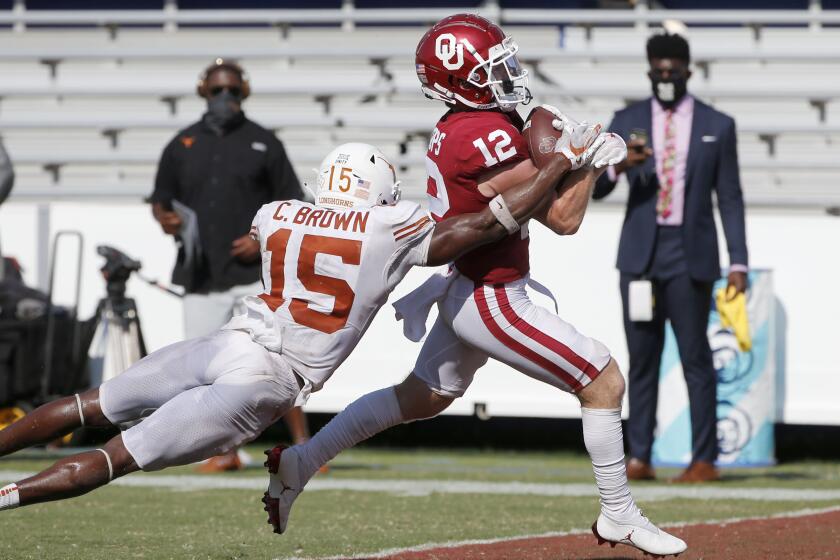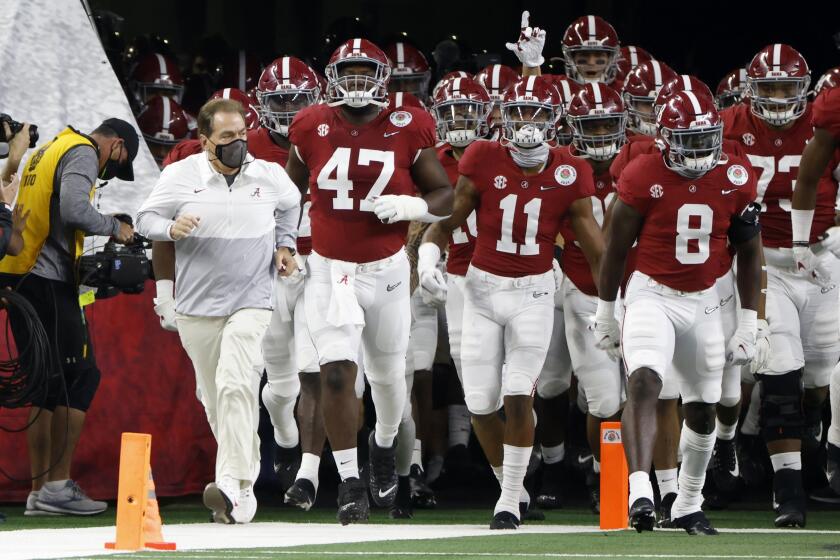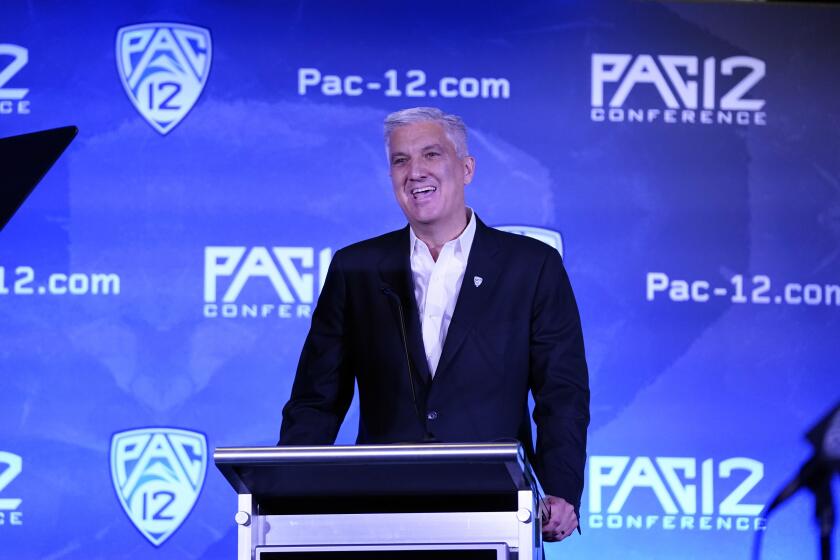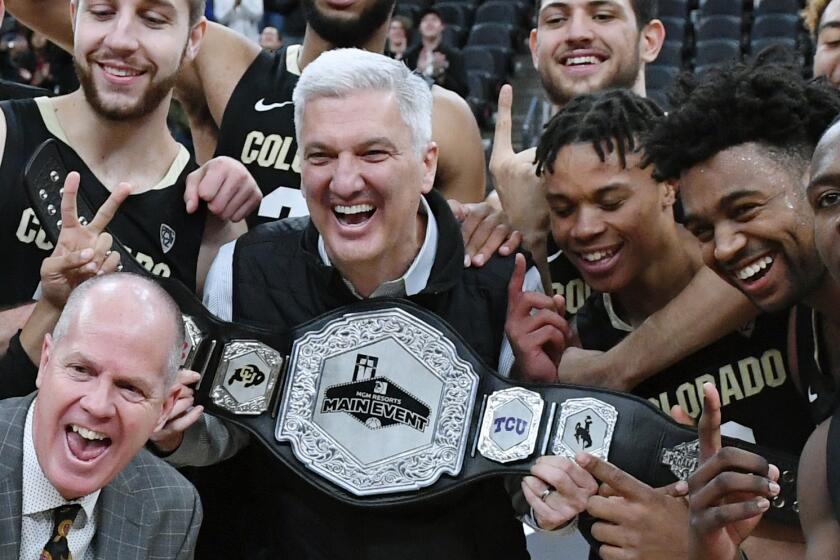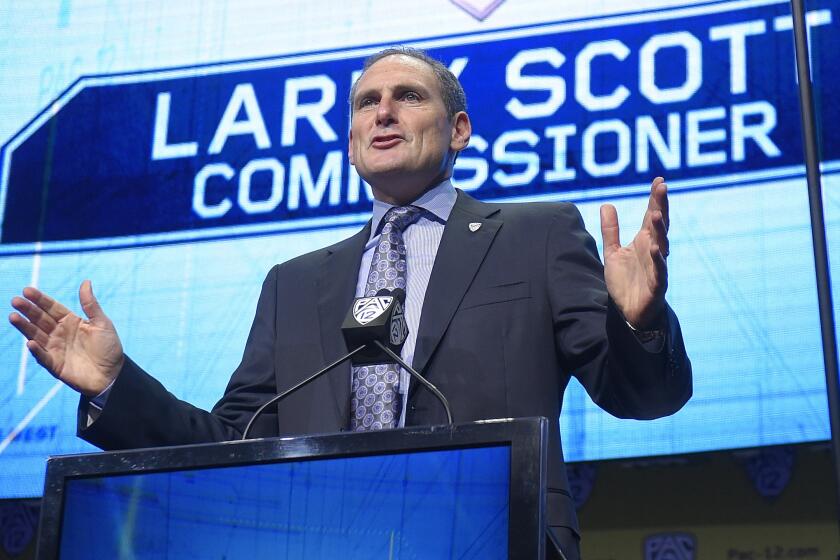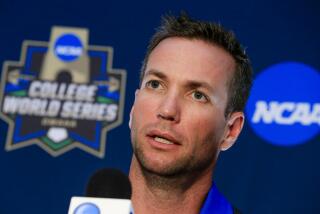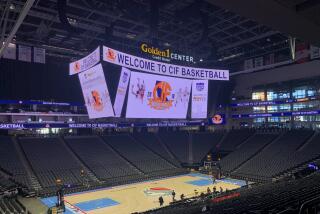Why George Kliavkoff could give the Pac-12 an edge in conference realignment
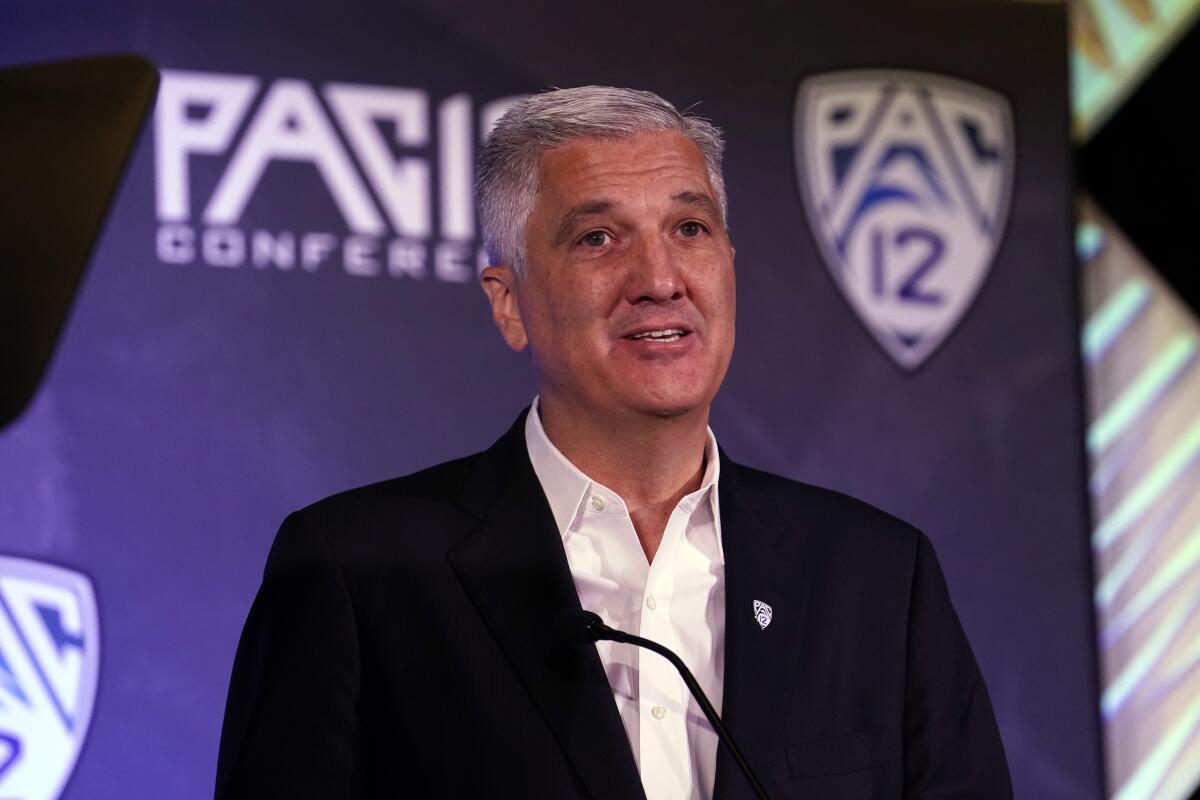
- Share via
George Kliavkoff had a nice little plan laid out for his first visit to Los Angeles as the Pac-12 commissioner.
A Monday tour of SoFi Stadium with the conference’s athletic directors. A dinner that night with the league’s head football coaches and players that was meant to impress. A breeze through Pac-12 football media day the next morning, hitting the talking points on reestablishing dominance in football and men’s basketball. Then, Wednesday, he would start his “listening tour” of the campuses at USC, spending the day getting to know what has traditionally been the league’s most valuable property. For an outsider to college athletics, the whole thing sounded pretty doable.
“Then the world exploded,” Kliavkoff says. “Which is fun.”
He relaxes his long and slender collegiate rower’s frame into a plush white leather sofa in the lobby of the W Hollywood and shares a laugh at how Texas, Oklahoma and the Southeastern Conference detonating a bomb on the college sports landscape has altered the vibes of his trip to L.A.
Two months ago when the Pac-12 announced Kliavkoff’s hire, most everyone in this room at media day — athletic directors and coaches included — knew nothing of him before feverishly typing his name (pronounced Klee-av-cough) into search engines. Now the new guy is being asked to present a calm demeanor in the face of rampant, unchecked fear.
The Longhorns and Sooners have left the Big 12 for the SEC. Without its two marquee brands, the Big 12 is effectively dead as a Power Five league (of course, critics have felt the same about the Pac-12 in recent years, too, and that’s with all members present). The specter of another round of realignment — conferences expanding and contracting as schools seek not just any home but the best one — has the whole industry feeling more insecure than even usual.
The Pac-12 schools are carrying lingering frustration from the decade of decline in prestige and money overseen by former commissioner Larry Scott from his ivory tower in downtown San Francisco. Some wounds are so deep they can only heal with time. But ultimately, these universities just want the stability of a viable long-term conference home that will allow them to run their athletic operations in the black and compete at the highest level while dodging any existential threats. And they are counting on Kliavkoff to confront the chaos with cunning and deliver that security.
The Pac-12 Conference, unlike the Big 12, won’t be decimated by any potential moves Texas and Oklahoma make to the SEC.
So this is your idea of fun, eh, commissioner?
“I love it, I love it, I love the complexity,” Kliavkoff says. “I was excited that I’d get two or three of these really complex, meaty issues my first year. It turns out I got six or seven of them in the first month. But that’s just what it is. It’s three-dimensional chess, and it’s fun to play.”
There’s that word again. He must really mean it.
“He’s good at navigating ambiguity, when you don’t know what the answer is but you know there’s a lot of disruption,” says Beth Comstock, who brought Kliavkoff in as chief digital officer at NBC Universal around 2006. “That’s why we hired him at NBC. Out the other end came something that’s withheld the test of time.”
That something is Hulu, the successful streaming platform. Kliavkoff’s past is packed with instances of making moves that seemed obvious to him and weren’t pursued as quickly by competitors. The commonality with most of his achievements is that they brought entertainment content to consumers in fresh ways and made his stakeholders rich. While his hire by the Pac-12 out of MGM Resorts came as a surprise to many, it shouldn’t have been given that those results are precisely what the conference needs from its next media rights negotiations in 2024.
Adding new members should be viewed as an opportunity to improve the league’s offerings for potential bidders, but any additions would have to be so clearly beneficial to the overall revenue pie that it won’t matter there are more slices to divvy up.
Kliavkoff’s early research indicates his schools are in an enviable position.
With the SEC poised to add Texas and Oklahoma, four Los Angeles Times writers gathered to draft four, 16-team super conferences. The selections and snubs may surprise you.
“We’re in an exclusive club,” Kliavkoff says. “Anyone who’s in the Pac-12 has a golden ticket.”
Already, he has been playing the role of the Pac-12’s Willy Wonka, fielding “significant inbound interest” from schools ready to venture out west. But just because he has golden tickets to hand out doesn’t mean he will.
All Kliavkoff can do is make recommendations to the presidents and chancellors, who would need at least nine of 12 votes to invite new members.
With the college sports world teetering on its axis yet again, Kliavkoff’s challenge is to learn what he doesn’t know while staying true to the instincts that got him here.
::
From where Kliavkoff sat from his office on the Las Vegas Strip, he had the best job in entertainment as the MGM Resorts president of entertainment and sports.
“MGM’s new tagline was ‘Welcome to the Show,’ ” says Steve Hill, CEO of the Las Vegas Visitor and Convention Bureau. “George was in charge of the show.”
Kliavkoff arrived in Sin City three years ago as an outsider to Vegas casino culture — just as he’s entered the fray in college athletics. He quickly got the lay of the land and oversaw all of MGM’s live events and the ascent of its fledgling sports betting app, BetMGM.
Kliavkoff built a genuine trust with MGM CEO Bill Hornbuckle, who let him work his magic across the Strip and beyond.
“He didn’t know a whole lot about Vegas entertainment,” Hornbuckle says, “but he picked it up because he was open, and he listened. He doesn’t have any ego. He was known as a can-do guy, and he was really adaptable at new things, the entertainment of the future.”
Pac-12 commissioner George Kliavkoff said SEC expansion strengthens the Pac-12’s standing and potential new members would have to clear a high bar to join.
One day in the spring, Kliavkoff checked his voicemail to find a message from a recruiter. He had been ignoring all career flirtations and had no desire to leave MGM. He was happy running the show, even during a global pandemic that had drastically handcuffed live events. But he could not ignore this call.
Kliavkoff had a relationship with the Pac-12 from his work with the men’s and women’s basketball tournaments at T-Mobile Arena, which is operated by MGM. He always loved attending the games and being a part of the experience. Of course, he had heard about Larry Scott’s unceremonious departure and knew the conference had arrived at a crossroads.
Could he really be the Pac-12 commissioner? College sports were certainly a passion.
“I was a very bad rower at Boston University,” Kliavkoff says with a chuckle, “but being on the team taught me some life lessons that I think have made me a better parent, a better business person. Combine that with the mission that underlies what we do — if we do our job well, more young men and women get educational opportunities they otherwise wouldn’t have.”
And there was something else.
“Candidly,” Kliavkoff says, “the fact that there was so much obvious transition coming into college athletics … I thrive in those environments. Those things made it an easy return phone call.”
Before long, Kliavkoff was walking into Hornbuckle’s office and telling him some shocking news.
The Pac-12 made a surprise move by naming MGM president of entertainment and sports George Kliavkoff its new commissioner. Here’s who they selected.
“I never thought I would leave this company or this job,” Hornbuckle recalls Kliavkoff saying, “but I’ve gotten an offer for a job that is something I’ve always dreamed of. And I can’t find a way to say no.”
Hornbuckle tried to entice him to stay. It got emotional at times, but he couldn’t crack Kliavkoff’s resolve.
“He’s ideally suited for the Pac-12,” Hornbuckle says. “He knows television, he knows digital, he’s a massive sports fan, he knows leadership, he knows marketing, and I think, most importantly, when you think about the Pac-12, you have a series of presidents and athletic directors and coaches and other constituents, and he’s a collaborator. He’ll get things done, and he’ll do it through people.”
::
Looking at his track record, Kliavkoff’s rise to the top rung of the business world started when his big ideas met the able hands of talented folks around him.
At Major League Baseball in 2004, Kliavkoff oversaw MLB Advanced Media’s successful video and audio streaming of live games, which set the trend for other professional sports leagues and made MLB a boatload on subscription fees.
“George very much saw that whatever people were doing with a computer on their desk, they would eventually be doing from their cell phones,” says Adam Ritter, whom Kliavkoff hired at MLB with this in mind. “This was before the iPhone, but George saw the writing on the wall.”
Kliavkoff viewed Ritter as a wireless savant who could position MLB to be ready for whatever came next. He empowered his young employee in ways that stick with Ritter 15 years later.
“What impressed me most about George is that sometimes when you report to somebody and something goes well, they might take credit for it, but not George,” Ritter says. “When I did my first deal, he marched me into the CEO’s office and said, ‘Look what Adam did.’ That really struck a chord with me.”
And, sure enough, when the iPhone was released, MLB’s “At Bat” was one of the first 500 apps available in the App Store. Kliavkoff wasn’t around to bask in the glory, though; by then he had already moved on to NBC Universal, where he was in the middle of a developing crisis.
“It was a very intense time,” Comstock says. “Especially back then in the TV world, it was a time of excitement but also great fear. Platforms like YouTube were just emerging, and it was either laughed off like ‘that’s so crazy’ or people were really afraid they were going to totally take over media. With that background, in walks George K.”
The Pac-12 hires George Kliavkoff, an MGM Resorts International executive, as its commissioner. He has no college sports experience.
Kliavkoff’s first move was to sell the most powerful producers at NBC, like Saturday Night Live’s Lorne Michaels, of the importance of opening their minds to digital offerings. Then, with networks concerned about their content ending up on YouTube for free, Kliavkoff set his sight on securing a stake in a streaming platform — something NBC had not been able to do.
But NBC knew that Fox had also failed to break into streaming. Kliavkoff saw an opportunity to turn their individual failures into a combined success. He led NBC’s vision in partnering with its competitor on what would eventually become Hulu.
“George is very multitalented,” Comstock says. “He’s a lawyer by training, has great business acumen and came in as a builder and a strategist. It is very hard to find all that capability in one person.”
Says Hill, Kliavkoff’s Vegas colleague, “Three to four different people will be in charge of what George was responsible for at MGM. He’s a little bit of a unicorn.”
“I find that if you’re actually friendly and nice with people you can get stuff accomplished that you otherwise wouldn’t.”
— Pac-12 Commissioner George Kliavkoff
The Pac-12 doesn’t need Kliavkoff to be a creature with mythical status, although the task ahead appears Herculean:
— Fix Pac-12 football, returning USC to power as soon as possible.
— Position the league to cash in on its next media rights negotiations, figuring out how to recoup the previous investment the schools have put into the Pac-12 Networks.
— Decide on a new home for conference headquarters, with its expensive San Francisco lease ending in two years. (Las Vegas, where Kliavkoff still lives, is the assumed destination.)
— It may not be as important to the schools’ bottom lines, but Kliavkoff also needs to restore faith in his office after years of Scott struggling to build personal relationships with campus leaders — a struggle Scott admitted to The Times last fall.
Larry Scott and the Pac-12 announced they are parting ways at the end of June, ending the commissioner’s turbulent 11-year run.
Those who have worked alongside Kliavkoff in the past say he is a natural fit to rebuild morale.
“I find that if you’re actually friendly and nice with people you can get stuff accomplished that you otherwise wouldn’t,” Kliavkoff says. “I try to be very high ethics. I want people to know that if I say something they can trust me, and I expect the same from other folks. When you have that as a base, it makes doing complicated things easier.”
At his introductory press conference, Kliavkoff wowed Pac-12 administrators with his preparation. He addressed the myriad weighty issues facing the league before he could be asked about them, making it clear he understood what he was up against leading a conference that hadn’t won a football national championship since 2004 or a men’s basketball title since 1997.
Kliavkoff boldly stated that winning in those sports would become the unquestioned priority in the “Conference of Champions,” even to the possible detriment of the league’s beloved Olympic sports. That rubbed some the wrong way, but Kliavkoff doubled down on that notion at media day with the support of all 12 athletic directors.
Under Kliavkoff, it appears the Pac-12 won’t be backing down from a fight. But does that mean it will be an aggressor in realignment in the coming months?
“We own all the Power Five schools in the mountain and pacific time zones,” Kliavkoff says. “I think that’s a defense and a moat that helps us. But we still have to think about: what would be the reason to expand?”
The Pac-12 is betting he’s the right person to come up with the answer.
More to Read
Go beyond the scoreboard
Get the latest on L.A.'s teams in the daily Sports Report newsletter.
You may occasionally receive promotional content from the Los Angeles Times.

